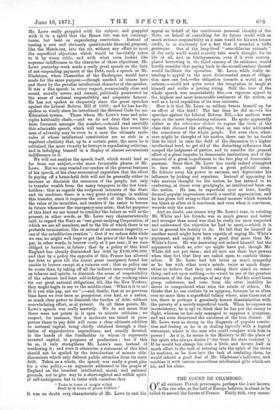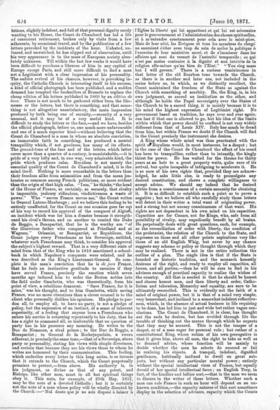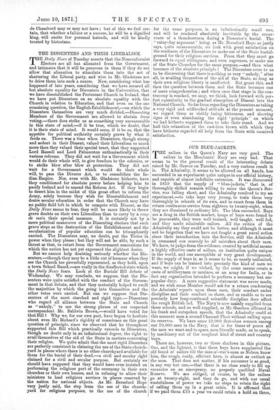THE COUNT DE CHAMBORD.
OF all eminent French personages, perhaps the least known is the one who, as the half of Europe believes, is about to be called to ascend the throne of France. Fairly rich, very unam- bilious, slightly indolent, and full of that personal dignity rarely wanting to his House, the Count de Chambord has led a life of consistent retirement, broken only by visits from a few adherents, by occasional travel, and by the publication of a few letters provoked by the incidents of the hour. Unhated, un- feared, and unwatched, he has slipped out of observation, until his very appearance is to the mass of European society abso- lately unknown. Till within the last few weeks it would have been difficult to purchase, a likeness of him in any capital of Europe except Paris, and still more difficult to find a man not a Legitimist with a clear impression of his personality. The sudden revival of his chances, however, is provoking in- quiry, the Catholic Church is interesting itself in his success, a kind of official photograph has been published, and a sudden demand has tempted the booksellers of Brussels to replace the cheap edition of his letters published in 1860 by an edition de luxe. There is not much to be gathered either from the like- nesses or the letters, but there is something, and that some- thing is not altogether unsatisfactory, the main impression produced by both being one of serenity,—serenity of a very -unusual, and it may be of a very useful kind. It is difficult to study the letters or the face,—and we have, besides the official photograph, before us, one much more unfavourable and one of a much superior kind—without believing that the 'Count de Chambord is a man in whom an absolute conviction, an immovable faith in something, has produced a mental tranquillity which, if not goodness, has many of its effects. The ground-tone of the face and of the letters, which latter cover more than a quarter of ¢ury, is unmistakable,—it is pride of a very lofty and, in one way, very admirable kind, the pride which produces calm. Royalism is not merely the essential quality of the Count de -Chambord's mind, it is the mind itself. Nothing is more remarkable in the letters than their freedom alike from animosities and from the mean jea- lousies so common among French politicians, or more evident than the origin of that high calm. "lam," he thinks," the head -of the House of France, so certainly, so securely, that rivalry- is impossible, jealousy ridiculous, vindictiveness a waste of power." Who "serves France serves me," the Count writes to General Latour-Maubeuge ; and we believe this feeling to be entirely unaffected, for the Count on one occasion goes far oqt -of his way to record his approval of the conquest of AlgierS, an incident which was for him a disaster because it strength- ened his rival's throne, and on another to remind the Duke de Reggio, a Bonapartist, that he is the worthy son "of -the illustrious father who conquered at Friedland and at Wagram." Orleanist, or Bonapartist, or Republican, the Count judges every Frenchman as his Sovereign, entitled, whatever such Frenchman may think, to consider his approval the subject's highest reward. That is a very different state of mind from that of the King who in 1816 sanctioned a school- hook in which Napoleon's conquests were related, and he was described as the King's Lieutenant-General. So corn-, plete is the man's conviction that he is de jure France, that he feels an instinctive gratitude to enemies if they have served France, precisely the emotion which seven months ago induced him to order the Breton nobles into the field under G-ambetta, who was theoretically, from his point of view, a rebellious democrat. "Save France, for it is mine," was his thought, and to him Gambetta, while saving France, was no more obnoxious than a clever counsel is to the client who personally dislikes his opinions. His pledge to par- don all, to employ all, to have no party, is not a pledge of policy, but the expression of an instinct, of a sense of inherent superiority, of a feeling that anyone born a Frenchman who enters his service is returning repentantly to his duty, that he has a right to command all, so inalienable that no question of party has in his presence any meaning. He writes to the Duc de Nemours, a rival prince ; to the Due de Reggio, a Bonapartist ; to General de la Rochejaquelain, a sworn adherent, in preciselythe same tone,—that of a Sovereign, above party or personality, stating his views with simple directness, and certain that because they are his views those to whom he writes are honoured by their communication. This feeling, which underlies every letter in this long series, is so intense that it extends to the Church, which the Count perpetually promises to protect,—from above. His authority is, in his judgment, as divine as that of any priest, and Bishops, like other men, must in all but spiritual things obey it. This note, for example, of 29th May, 1857, may be the note of a devoted Catholic ; but it is certainly not the note of a man whose policy will be wholly directed by the Church :—"Nul doute quo je ne sois dispose is laisser is l'Eglise la liberte qui lai appartient et qui lui est necessaire pour le gonvernement et l'administration des chases spirituelles, et is m'entendre constamment pour cela avec Is saint-pre. Mais de leer elite, les Eveques et toils lee membres du dere ne sauraient eviter avec trop de soin de meler la politique a l'exercice de 'ear ministere &Lore, et de s'immiscer dans lee affaires qui soul du ressort de l'autorite temporelle ; ce qui n'est pas moms contraire is in dignite et aux interets de In religion elle-memo qu'au hien de l'Etat." "You sing mass but I will govern." There is a curious reminiscence in that letter of the old Bourbon tone towards the Church, as there is in another and later one, not included in the series before us, in which, as we distinctly recollect, the Count maintained the freedom of the State as against the Church with something of acerbity. He, the King, is, in his own judgment, as sacred an institution as the other, and although he holds the Papal sovereignty over the States of the Church to be a sacred thing, it is mainly because it is to his mind the highest expression of Legitimist right. No government based on tradition, he says over and over again, can last if that one is allowed to go, but his idea of the limits within which that power should be confined is not very widely different from that of Louis XIV. Italy has much to dread from him, but within France we doubt if the Church will find in the Count precisely the instrument she desires.
A King whose whole mind was thus penetrated with the spirit otRoyalism would, in most instances, be a despot ; but in the case of the Count de Chambord the effect of his creed has been to tranquillize, rather than to intensify, the kingly thirst for power. He has waited for the throne for thirty years as an heir to a great property waits, quite sure of its arrival, but quite incapable of intriguing to accelerate it. He is so sure of his own rights that, provided they are acknow- ledged, he asks little else, is ready to promulgate any desired constitution, and shows a complete willingness to accept advice. We should say indeed that he desired advice from a consciousness of a certain necessity for obtaining it. It is as difficult to establish such a point as to prove a negative ; but we believe all who carefully study these letters will detect in their writer a total want of originating power, 'and a strong but not uneasy consciousness of that want. His rights are not dependent in his own mind on his capacities. Capacities are for Caesars, not for Kings, who, safe from all possibility of rivalry, may expediently benefit by all brains. He perpetually deals with .great questions, such, for example, as the reconciliation of order with liberty, the condition of the proletariat, the relation of the Church to the State, and expresses on those and all other points aspirations very like those of an old English Whig, bat never by any chance suggests any scheme or policy or thought through which they may be realized. There is not in the entire collection the outline of a plan. The single idea is that if the State is founded on historic tradition, and the monarch honestly desirous of the right, and ready to employ all capacities, all forces, and all parties,—then he will be sure to find in his advisers enough of practical capacity to realize the wishes of the country. All that is needed is that he should be honest and choose honest men, and then liberty and order, Catho- licism and toleration, Monarchy and equality, are sure to be ultimately reconciled. This is evidently not the faith of a mind of original power, but it is that of a mind very simple, very benevolent, and inclined to a somewhat indolent reflective- ness, which, in the absence of actual business in life requiring to be done, has led him to just and wide but rather vague con- clusions. The Count de Chambord, it is clear, has thought out the ends he desires, bat has avoided through life the trouble of thinking out the means through which he expects that they may be secured. This is not the temper of a despot, or of a man eager for personal rule; bat rather of a constitutional King, whose notion of his own prerogative is that it gives him, above all men, the right to take as well as to demand advice, whose function will be mainly to decide whether the men he selects do succeed or fail in realizing his objects. A tranquil, indolent, dignified gentleman, habitually inclined to dwell on great sub- jects, but without any particular mental power ; entirely without the special intellectual vices of France, but equally devoid of her special intellectual force ; an English Tory, in fact, of the kindlier and loftier sort,—that is the man we seem to discern in the writer of these letters. Whether such a man can rule France in such an hour will depend on an un- known condition,—the capacity natures of this sort sometimes display in the selection of advisers, capacity which the Comte de Chambord may or may not have ; but of this we feel cer- tain, that whether a failure or a success, he will be a dignified king, will excite few personal hatreds, and will be kindly treated by historians.




































 Previous page
Previous page